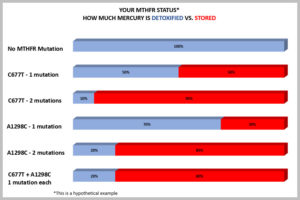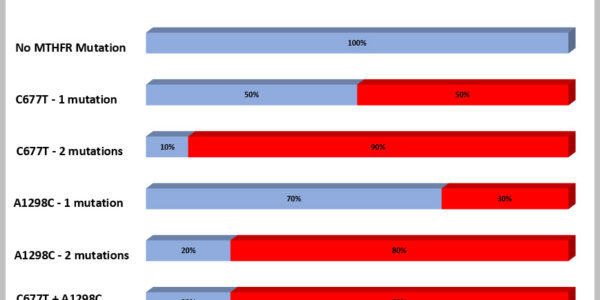You have no energy, and you can’t sleep at night. The doctor has told you that you have some problems with your thyroid. Brain fog? Oh, yeah, you can hardly remember what you did yesterday at work. If this sounds like you, would you like to regain control of your health before it controls you? Did you know that DNA testing may give you some answers as to why you are feeling so bad and your body is falling apart in front of your eyes?
What if you knew that your DNA is also responsible for activating many nutritionals such as Vitamin D, Vitamin A, Vitamin K, and B vitamins? All these vitamins are necessary for our health. I would like to focus on a B vitamin called folate which you will soon see can very important to the body.
Folate is the metabolized version of folic acid. The body uses MTHFR (MethyleneTetra Hydro Folate Reductase) to create folate, and the amount of available enzyme is controlled by a gene with the same abbreviation. Most of us have two MTHFR genes. A great number of people have no problem metabolizing folic acid. However, close to 50% of us have a genetic variation of the MTHFR gene. A variation means that there is a difference or error in the base pair sequence. This variation can be of little significance or it may make the gene almost totally useless. Fortunately, we have a second copy of MTHFR, because folate is very important for our metabolism. It is required for repairing DNA, recycling molecules needed for detoxification, reducing inflammation and turning genes off and on.
MTHFR has a major effect on how efficiently methylation occurs. The methylation cycle begins with methionine (an amino acid found in protein foods). Methionine is converted to homocysteine (which is another amino acid) with the assistance of MTHFR and folate. Homocysteine is then converted back to methionine. I know it seems strange, but this is how the body makes methyl groups (a carbon with 3 hydrogen atoms). This cycle limits the build–up of homocysteine,and at the same time, limits the amount of methionine. Think of this methylation cycle as a “governor” for our metabolic engine. When this cycle isn’t working because of inadequate amounts of MTHFR, the results are dysfunction or disease.
Low levels of MTHFR have been associated with increased risk of Heart disease, stroke, high blood pressure, preeclampsia, birth defects, embolisms, memory impairment, cancer, fertility difficulties, migraines, depression, anxiety, mood disorders, autism, thyroid issues, etc. (see below)
Since most of us have two copies of MTHFR, we can have two perfectly functioning genes, or some permutation of full, partial or non-functional for each gene pair. If you have experienced any of the conditions listed above, you may not have two perfectly functioning MTHFR genes. Monitoring folic acid intake is important because the quantities of MTHFR enzyme can become so limited that your body is not able to convert folic acid to folate in adequate amounts.
One of the most important roles of MTHFR is detoxification of heavy metals like mercury or lead. I want to give you a practical example of how the mutation of this gene can affect health.
Let’s say you love tuna and because you live in Minnesota, you eat it in the form of tuna noodle casserole or if you prefer, tuna noodle hot dish. Tuna, you may recall, contains a high concentration of mercury. Let’s say for convenience, that you get 10 units of mercury from the meal.
If you have the wild-type of MTHFR (no mutations), you will eliminate all 10 units of mercury (assuming your other detoxification methods are optimal). If you have a mutation at C677T (this is a location on the DNA called a SNP or snip), then your detoxification for mercury is reduced by 50%. This means that you eliminate 5 units of mercury and keep 5 units stored in your body. If you, unfortunately, have two mutations of C677T, your ability to remove mercury is reduced to only 10%. This means you eliminate 1 unit of mercury and keep 9 units in your body. Of course, tuna isn’t the only way you are exposed to mercury. It’s in our water, other food, and dental amalgams.

The chart illustrates the effect of A1298C mutation as well as the C677T mutation. The worst situation is if you have 2 MTHFR genes with the C677T mutation. Please remember that the mercury example is hypothetical to help you understand how different mutations can affect us. It is not based on any real data.
If you do the right thing and have your DNA tested and find out you do have an MTHFR mutation, how do you help your body work with this?
First steps to take after confirmation you have the MTHFR mutation:

